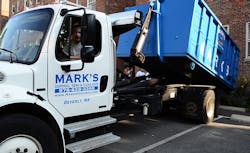Manager: Mark Pyne
Title: Owner and president
Fleet: Mark’s Disposal, Beverly, MA
Operation: A demolition and disposal company operating four sport utility vehicles, a dump truck, and two roll-on/roll-off dumpster trucks
Problem:
When a small business focuses on charging forth to best serve its customers, mundane vehicle-maintenance tasks such as changing engine oil can slip so far down the “to-do list” that they threaten long-term consequences.
Mark Pyne has learned that the hard way while building his demolition and disposal business from the ground up over the past 12 years.
The thing is, working as a professional demolition contractor handling complete renovation projects, job site pickups, and disaster cleanup isn’t a 9-to-5 occupation. At times, the pressing crush of work obligations would push seemingly mundane equipment needs like oil changes out of sight and out of mind.
Unfortunately, that’s not a long-term strategy for vehicle reliability and Pyne knew that. At the same time, he didn’t want a “one-off” solution just to deal with oil change reminders. Rather, he wanted such reminders to be part of a larger system designed to improve the overall efficiency of the business so he could better maximize the value of his investment.
Solution:
Enter LoJack Corp. and its new fleet management system powered by TomTom. After checking out several options, Pyne settled on LoJack’s telematics offering for his small fleet because it solved several different issues for him, including keeping tabs on equipment maintenance needs.
LoJack Fleet Management powered by TomTom is a comprehensive GPS-based telematics system designed for tracking and managing fleets ranging from as small as five to as many as 5,000 vehicles. Pyne uses the system primarily to track the location of his equipment so he knows it’s in the proper place and at the proper job site. It also helps him to better map out daily schedules for his drivers. “I can look at locations via the Google satellite maps the system is connected to as well as traffic volumes reported by the TomTom part,” he explains.
The system helps track the speed of his vehicles so Pyne knows they are operating safely. Safe driving is what drove him to adopt the LoJack system for his fleet and a separate in-cab camera monitoring package as well. “One year I had a three-fold jump in insurance costs due to accidents, so we had to address that,” he says.
Since installing the LoJack telematics package in his fleet last August, Pyne has been able to cut fuel costs by about 10% largely through reduced idling. He’s also seeing a maintenance benefit, as the system is automatically set up to remind him—and his drivers—when certain preventive maintenance services are due.
“There’s a notification tab on the system’s dashboard specifically for maintenance intervals,” he points out. “The system reminds us when we are nearing the interval for engine oil changes or various PM services. That helps us also in terms of scheduling downtime for the vehicle, especially for our trucks, which we take to the local Freightliner dealership for service.”
“In the past, we might have exceeded the engine oil change mark by 1,000 to 2,000 mi. on our light vehicles,” he says. “But for our heavy equipment, we sometimes went over the mark by 6,000 to 7,000 mi. That’s not healthy for any kind of truck, and we knew we needed to pay better attention to those intervals.”
Over time, Pyne also expects that his ability to keep a better handle on vehicle operating parameters (speeding, hard braking, and unnecessary engine idling) along with better adherence to maintenance intervals will help him extend the useful life of his equipment.
“It’s reducing the daily wear and tear on our trucks,” he explains.
About the Author
Sean Kilcarr
Editor in Chief
Sean Kilcarr is a former longtime FleetOwner senior editor who wrote for the publication from 2000 to 2018. He served as editor-in-chief from 2017 to 2018.
